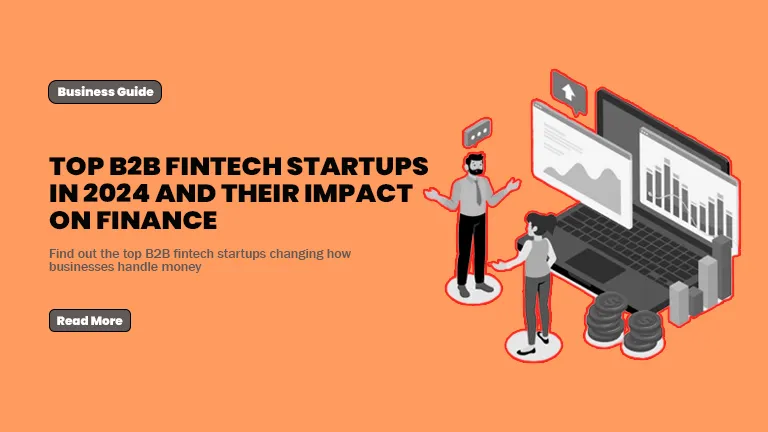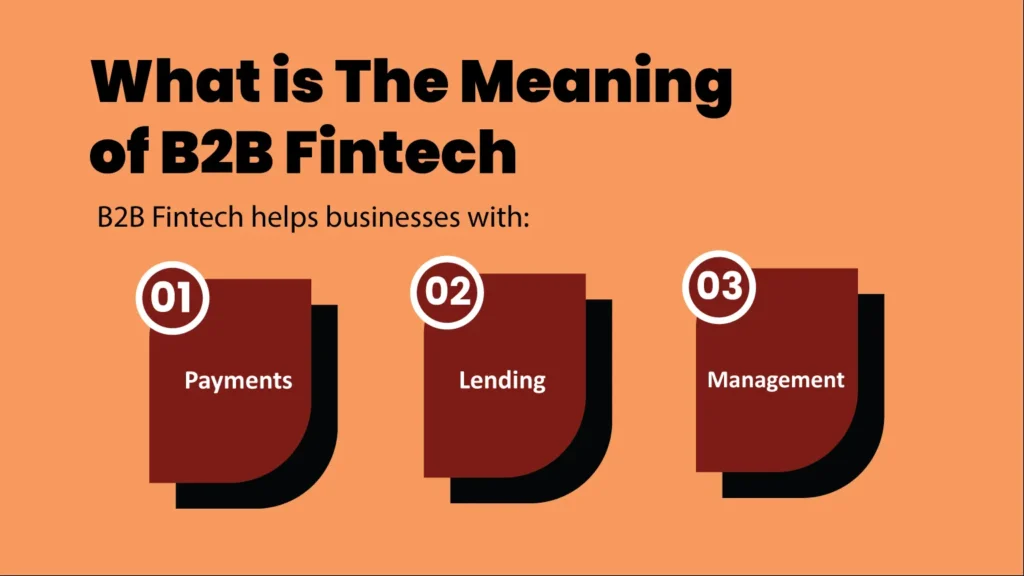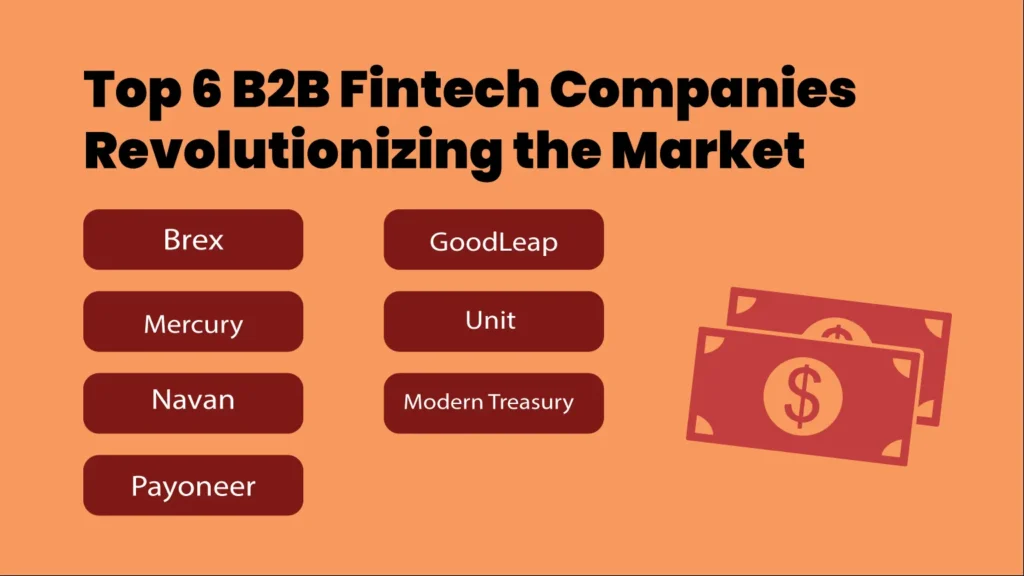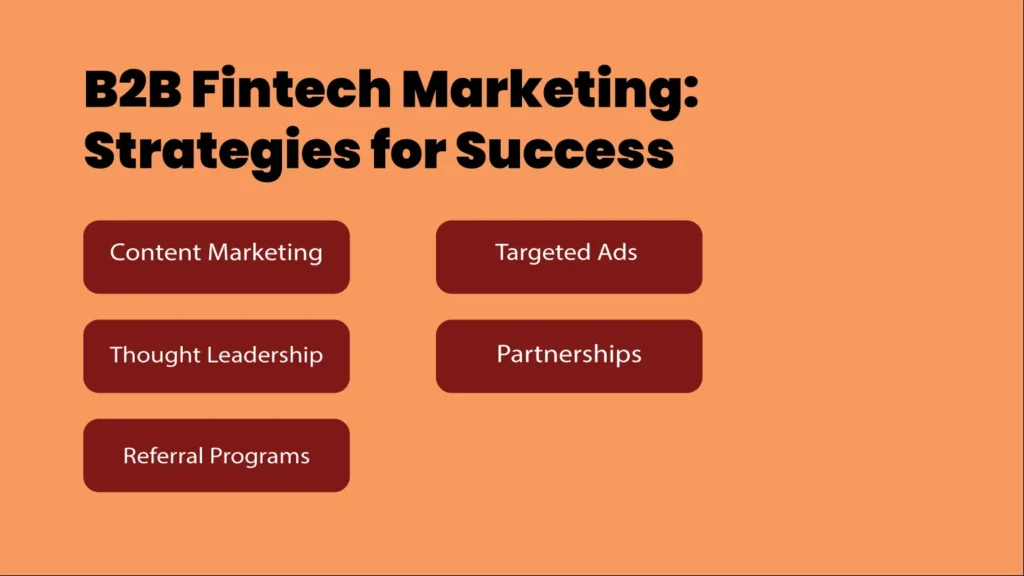Top B2B Fintech Startups in 2024-25 and Their Impact on Finance

Every business wants their tractions to happen fast and smoothly. It is the reason
in 2022, 64% of businesses processed B2B payments electronically.
It increased the demand for B2B fintech startups. Why? Because they’re helping companies.
- Manage finances
- Process payments
- Handle data
But that’s just the tip of the iceberg.
In this writeup, we’ll talk about: Some of the top B2B fintech companies out there. How these companies are using clever marketing strategies to grow. What makes these startups stand out in today’s business world?
What is The Meaning of B2B Fintech

B2B fintech helps businesses with financial tasks. It makes easier the:
- Payments
- Lending
- Management
It is different for apps for personal use and is built for companies. It focuses on improving business-to-business transactions.
So, we can say that B2C fintech works for individuals. B2B fintech supports companies.
It smoothens processes between businesses which makes it a must-have for modern operations.
Top 6 B2B Fintech Companies Revolutionizing the Market

Some B2B fintech companies are changing how businesses handle finances. Let’s look at a few leading names and what they offer.
1. Brex
Brex started by offering simple corporate cards for businesses. Now, it provides many financial solutions.
These include:
- Expense tracking
- Bill payments
- Travel management
The company also supports businesses in emergencies. After the Silicon Valley Bank collapse, it offered payroll services to help companies.
Brex is based in San Francisco, California. Its current valuation is $12.3 billion.
It has become very important for growing businesses.
2. GoodLeap
GoodLeap makes it easier for homeowners to finance solar setups. They offer loans specifically for residential solar installations.
The company is valued at $12 billion and is based in Roseville, California.
GoodLeap has:
- Assisted over 1,000,000 homeowners
- Supported 3,400 businesses
The total financing provided is around $20 billion. They offer more than 20 types of loans to fit different needs.
3. Mercury
Mercury is a fintech company valued at $1.6 billion. Mercury offers business banking services and financial tools for startups.
Its headquarters are in San Francisco, California. This platform provides:
- Business accounts
- Payment processing
- Financing options
Just a few days after the Silicon Valley Bank collapse, Mercury saw a surge in deposits.
It received up to $2 billion in new deposits during that time.
4. Unit
The unit launched in 2020 and is valued at $1.2 billion. This fintech startup provides businesses with the tools to create their banking services.
Many tech companies, including AngelList and Bill.com, use Unit’s technology to power their financial products.
It is in New York, New York. This platform offers services like
- Payment processing
- Business bank accounts
- Card issuance for businesses
5. Navan
Navan, formerly known as TripActions, is valued at $9.2 billion. It is headquartered in Palo Alto, California.
Navan provides a comprehensive app for managing business travel. The platform offers services for:
- Booking flights
- Booking hotels
- Managing other travel resources
Navan also includes software for travel management and customer service, with features like a support chatbot for quick assistance.
6. Modern Treasury
Modern Treasury is valued at $2.2 billion. The company provides a platform that simplifies payment operations for businesses.
Modern Treasury helps companies automate and manage their payments, including:
- Bank transfers
- Accounting tasks
It is headquartered in San Francisco, California.
7. Payoneer
Payoneer is a fintech company with a valuation of $3.90 billion. It specializes in simplifying cross-border transactions.
The platform allows businesses to send and receive payments in multiple currencies. Payoneer also offers tools for:
- Invoicing
- Currency conversion
- Payment management
It is widely used by:
- Freelancers
- E-commerce businesses
- Enterprises
Usually, when they deal with international payments.
B2B Fintech Marketing: Strategies for Success

As more businesses are turning to fintech for solutions. Good marketing helps you attract the right clients.
Have a look at some of the strategies that these B2B fintech companies use:
1. Content Marketing
They share helpful blogs and case studies. It is a way to trust and show their expertise.
2. Targeted Ads
They also run ads on platforms like LinkedIn. By this, they reach the right decision-makers easily.
3. Thought Leadership
They offer insights and solutions to common financial problems. This positions them as industry leaders.
4. Partnerships
They team up with other businesses. It helps them reach new clients.
5. Referral Programs
They encourage clients to refer to their services. This helps grow their network.
Conclusion
B2B fintech startups help businesses manage their finances more efficiently. Many companies are doing great in this field!
They are making financial operations more straightforward. These fintech companies use smart marketing strategies to reach the right audience.
Their solutions are changing how businesses handle payments, loans, and financial management.






